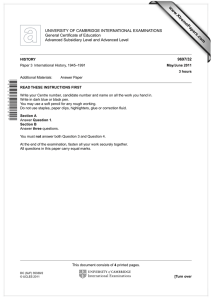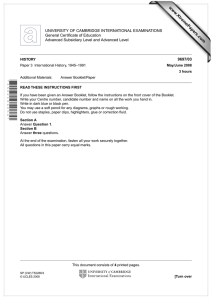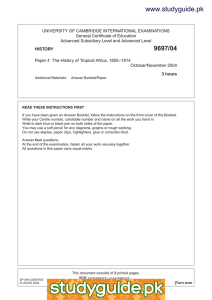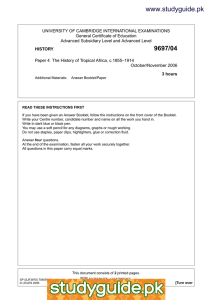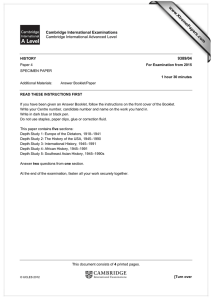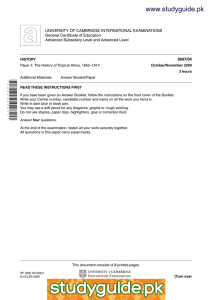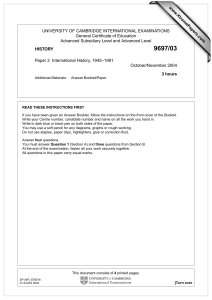www.XtremePapers.com
advertisement
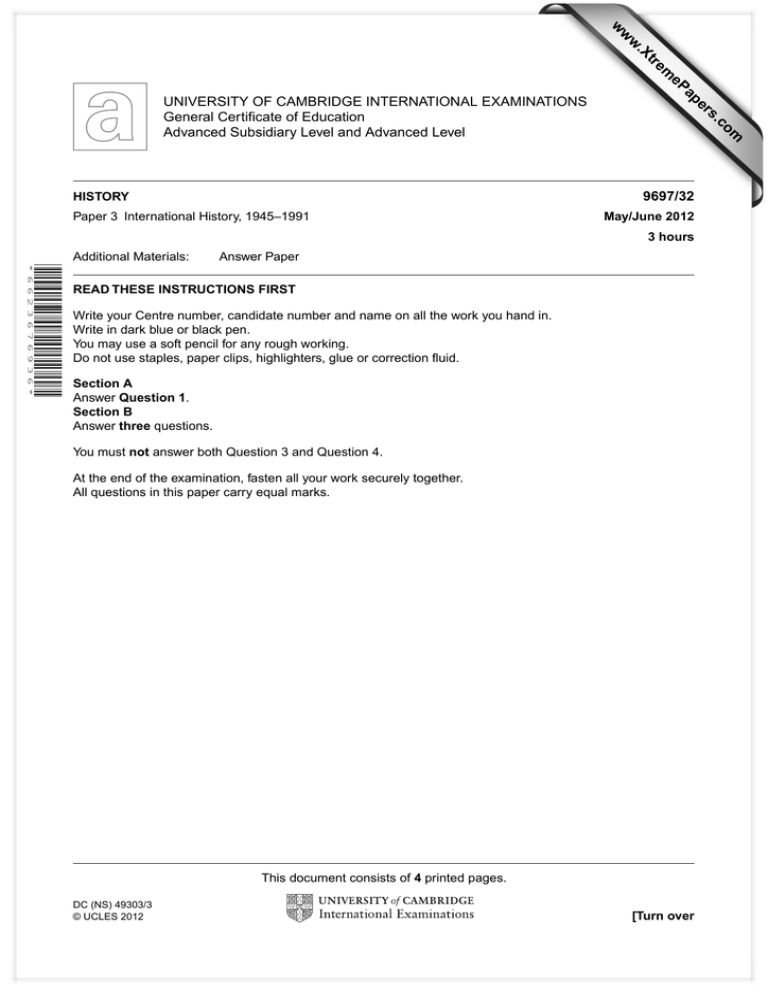
w w ap eP m e tr .X w om .c s er UNIVERSITY OF CAMBRIDGE INTERNATIONAL EXAMINATIONS General Certificate of Education Advanced Subsidiary Level and Advanced Level 9697/32 HISTORY Paper 3 International History, 1945–1991 May/June 2012 3 hours * 6 6 2 3 6 7 6 9 3 6 * Additional Materials: Answer Paper READ THESE INSTRUCTIONS FIRST Write your Centre number, candidate number and name on all the work you hand in. Write in dark blue or black pen. You may use a soft pencil for any rough working. Do not use staples, paper clips, highlighters, glue or correction fluid. Section A Answer Question 1. Section B Answer three questions. You must not answer both Question 3 and Question 4. At the end of the examination, fasten all your work securely together. All questions in this paper carry equal marks. This document consists of 4 printed pages. DC (NS) 49303/3 © UCLES 2012 [Turn over 2 Section A: The Development of the United Nations, 1945–1991 You must answer Question 1. THE BIRTH OF THE UNITED NATIONS 1 Read the Sources and then answer the question. When answering Question 1, candidates are advised to pay particular attention to the interpretation and evaluation of the Sources both individually and as a group. Source A At no time in history has there been a more impor tant conference than this one in San Francisco, which you are opening today. You members of this Conference are to be the architects of the better world. You are to wr ite the fundamental char ter. We must provide the machinery which will make future peace not only possible but certain. We represent the overwhelming majority of all mankind. We speak for people who have endured the most savage and devastating war ever inflicted upon innocent men, women and children. We hold a powerful mandate from our people . If we should pay merely lip service to inspiring ideals, and later do violence to simple justice, we would draw down upon us the bitter wrath of generations yet unborn. We can no longer permit any nation, or group of nations, to attempt to settle their arguments with bombs and ba yonets. We must build a new world in which the eternal dignity of man is respected. US President Truman addressing the opening session of the San Francisco Conference, April 1945. Source B WE THE PEOPLES OF THE UNITED NATIONS DETERMINED – to save succeeding generations from the scourge of war, and – to reaffirm faith in fundamental human r ights, in the dignity and worth of the human person, in the equal rights of men and women and of nations large and small, and – to establish conditions under which justice and respect for international law can be maintained, and – to promote social progress and better standards of life in larger freedom AND FOR THESE ENDS – to practice tolerance and live together in peace with one another, and – to unite our strength to maintain international peace and security, and – to ensure that armed force shall not be used, save in the common interest, and – to employ international machinery for the promotion of the economic and social advancements of all peoples, HAVE RESOLVED TO COMBINE OUR EFFORTS TO ACCOMPLISH THESE AIMS. Accordingly, our respective Governments have agreed to the present Char ter and do hereby establish an international organisation to be known as the United Nations. Preamble to the Charter of the United Nations, as signed by delegates of 50 nations at the San Francisco Conference, June 1945. © UCLES 2012 9697/32/M/J/12 3 Source C The formation of the UN was an illusory achievement. Disintegrating tendencies followed quickly and it is now much the same as the League of Nations, a pub lic forum employed by all the imperialist powers to project their respective plans, test out their friends and f oes, and lay the basis for winning permanent allies and creating coalitions in preparation for future struggles. The decline of the UN was already prepared at Teheran, Yalta and Potsdam. Its organisational structure guarantees control by the Big Five. There is a General Assembly of all the member nations, but this is little more than a debating society . Power presumably rests in the Secur ity Council, but its actions are subject to veto by any one of the Big Five. The veto system makes the UN a totally ineffective body, as should have been expected. From an article in ‘The New International’, a Marxist magazine, October 1947. Source D It is a myth that the UN was born out of an idealistic vision of a global body. In fact, the UN Charter was a meticulously crafted, power-orientated document, carefully moulded to conform to the global realities of 1945. It w as structured so that the Big Five powers were given the tools , including the veto, to prevent future wars. Many feel the veto power should be abolished. The truth is that the USA and its allies made it clear that the y would not participate in such a global organisation unless they possessed that power. Hence, the blueprint for the UN was not the product of naivety. The USA was the chief patron of the UN. The US State Depar tment produced the draft Charter. Washington had to pressure Churchill and Stalin, neither of whom was very enthusiastic, into supporting it, and it made cer tain that the 1945 conference was held on American soil. It paid the full cost of the two-month San Francisco Conference; and, as the most powerful country on earth in 1945, possessing the strongest military force in history, it freely exercised economic and military muscle to get its way on most issues. From an article by a British academic, 1997. Source E After World War II there w as broad support for creating an inter national organisation to prevent another global conflict. The UN Charter speaks eloquently of the need to 'save succeeding generations from the scourge of war’. Realistic American drafters, however, also carefully restricted the reach of the UN by limiting its role to cases that presented a threat to 'international peace and security’, in the hope of a voiding giving the UN a global licence for international social work. American officials also insisted on the veto power in the Secur ity Council as a condition of US membership, to ensure that no majority of UN members could ever threaten our national interests. From an article by an American academic, 2005. Now answer the following question. ‘A genuine commitment to ensuring a fairer and safer world was the main reason for the USA’s strong support for the establishment of the United Nations.’ How far do Sources A–E support this view? © UCLES 2012 9697/32/M/J/12 [Turn over 4 Section B You must answer three questions from this section. You must not answer both Question 3 and Question 4. 2 To what extent does the Marshall Plan of 1947 mark the start of the Cold War? 3 ‘From 1950 to 1975, the USA’s policy of containment was based on the mistaken assumption that there was something to contain.’ How far do you agree? OR 4 How far do you agree with the view that the USA failed to achieve its aims in the Korean War? 5 ‘The inability to cope with nationalist uprisings, both within the USSR and in Easter n Europe, was the main reason why the USSR collapsed by 1991.’ How far do you agree? 6 To what extent can the Nuclear Non-Proliferation Treaty of 1968 be considered to have failed? 7 Assess the impor tance of the USA to the de velopment of the inter national economy from 1945 to 1991. 8 ‘Divided and ineffective.’ How far do you agree with this assessment of the Non-Aligned Movement between 1955 and 1991? Copyright Acknowledgements: Question 1 Source C Question 1 Source D Question 1 Source E © http://www.marxists.org/history/etol/newspape/ni/vol13/no08/notm1.htm. © The World Policy Institute/Sage Publications. © http://www.cato.org/pubs/books/bolton chapter.pdf. Permission to reproduce items where third-par ty owned material protected b y copyright is included has been sought and cleared w here possible. Every reasonable effort has been made b y the publisher (UCLES) to tr ace copyright holders, but if any items requiring clearance have unwittingly been included, the publisher will be pleased to make amends at the earliest possible opportunity. University of Cambr idge International Examinations is par t of the Cambr idge Assessment Group. Cambridge Assessment is the br and name of Univ ersity of Cambridge Local Examinations Syndicate (UCLES), which is itself a department of the University of Cambridge. © UCLES 2012 9697/32/M/J/12
